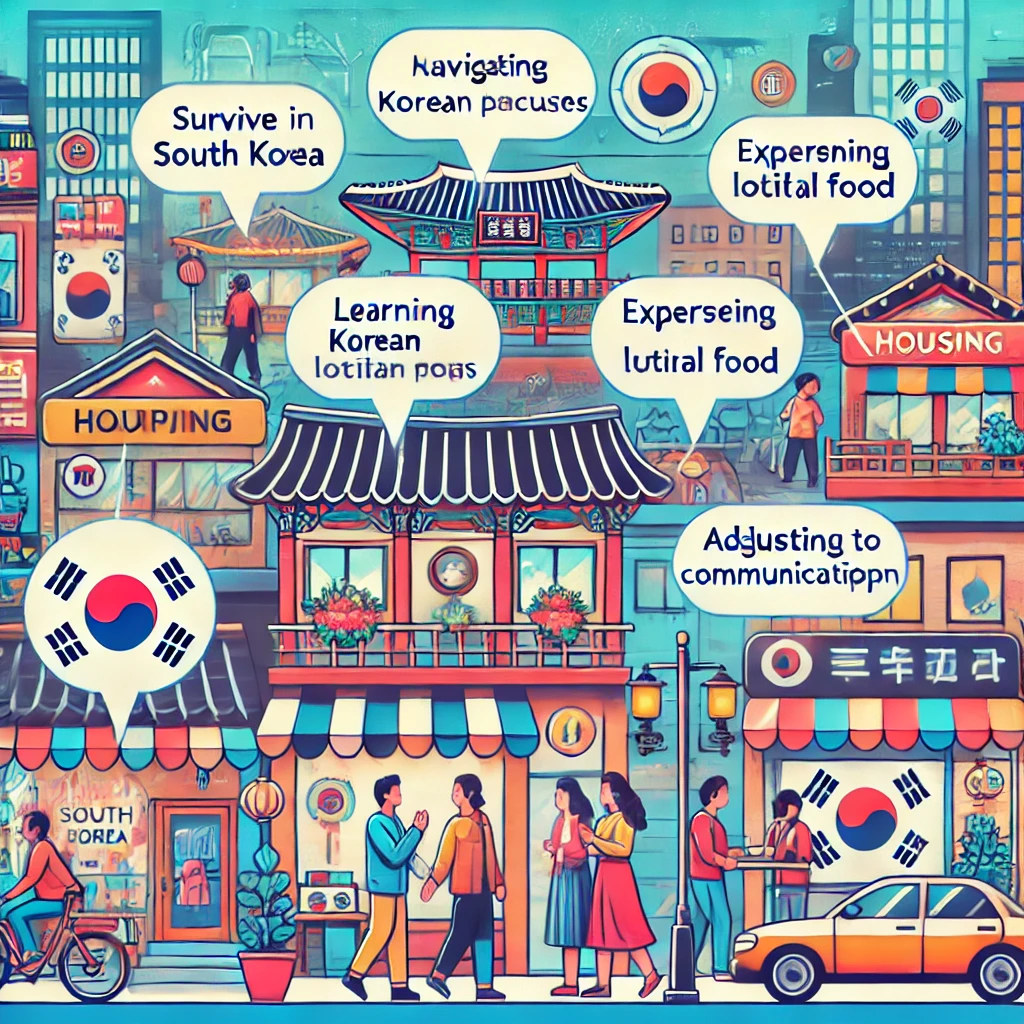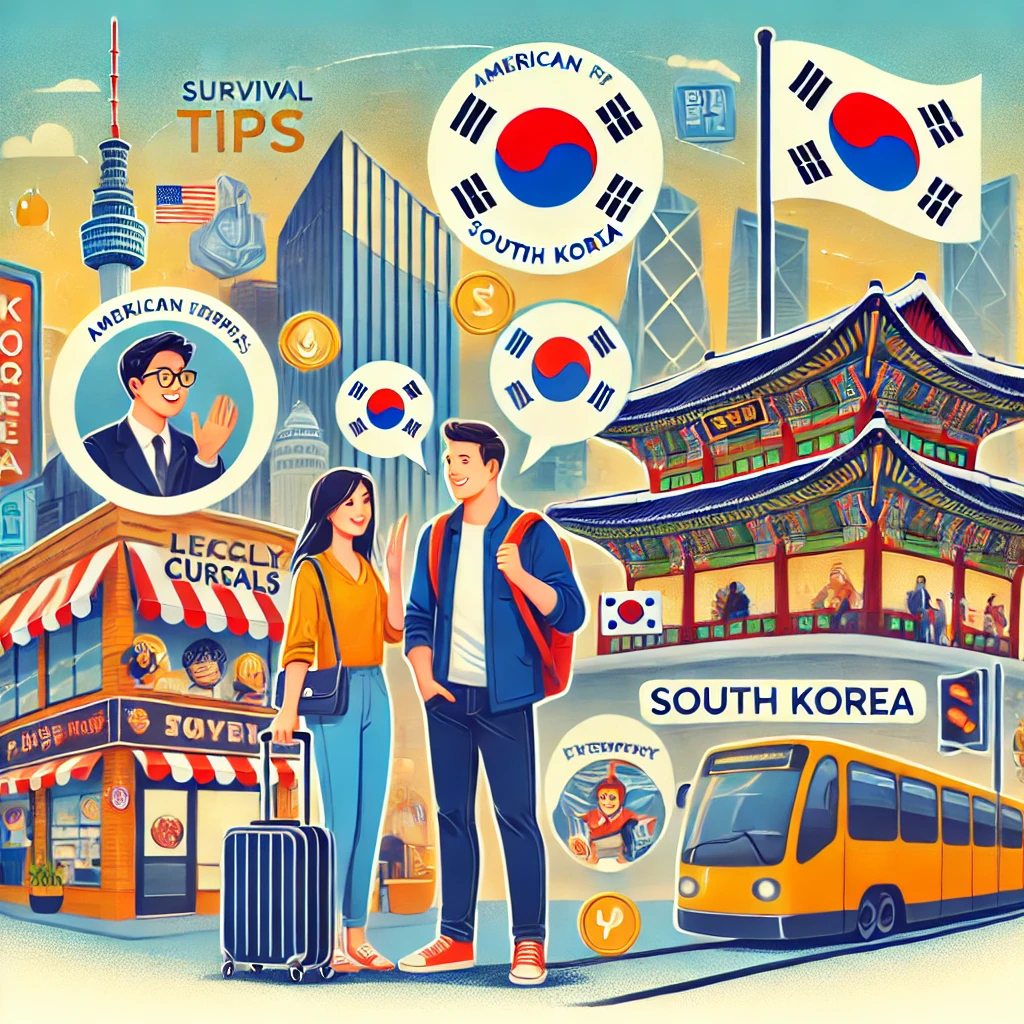Table of Contents
Understanding South Korean Culture
South Korea is a nation deeply rooted in its rich cultural heritage, which plays an essential role in shaping interpersonal relationships and societal norms. One of the most fundamental aspects of South Korean culture is the concept of respect, particularly towards elders and those in positions of authority. This respect is often demonstrated through language and behavior, with honorifics being a vital component of communication. Americans may find it necessary to adapt to these linguistic nuances, establishing a polite tone when addressing others, especially in formal settings.
Hierarchy is another significant element within South Korean society. Age and status influence social interactions and decision-making processes. Understanding this hierarchy will aid American expatriates in navigating both professional and personal relationships effectively. For instance, when entering a meeting, it is customary to bow slightly and acknowledge the highest-ranking individuals first. Such gestures of respect not only facilitate smoother interactions but also demonstrate an appreciation for South Korean customs.
Additionally, traditional customs and values are paramount in South Korea, where practices such as Confucianism permeate daily life. Family loyalty and social harmony are held in high regard, prompting a strong sense of community. Engaging in local traditions, such as Chuseok (a harvest festival) or Seollal (Lunar New Year), can provide valuable insights and foster connections with locals. To navigate cultural differences successfully, it is advisable for American expats to engage in active listening, ask questions, and demonstrate genuine interest in understanding South Korean culture.
In conclusion, embracing the nuances of South Korean culture—such as respect, hierarchy, and traditional values—can lead to more meaningful relationships and a smoother integration into society. By adapting to these cultural aspects, American expats can find a rewarding experience in their new environment.

Navigating the Language Barrier
For American expats settling in South Korea, the Korean language can present a considerable challenge. With its unique script, Hangul, and syntax vastly different from English, many newcomers find themselves grappling with communication. However, mastering some basic Korean phrases can significantly enhance one’s experience and facilitate deeper engagements with the local community.
To begin learning Korean, it is advisable to focus on essential phrases and vocabulary that relate to daily interactions. Basic greetings, common expressions, and polite conversation starters can make a profound difference in establishing rapport with locals. Language apps such as Duolingo, Rosetta Stone, and Memrise provide interactive ways to learn at one’s own pace and are especially useful for beginners. These platforms often gamify the learning process, making it enjoyable and less intimidating.
Moreover, local resources such as language exchange meetups can prove invaluable for American expats. Participating in these gatherings allows individuals to practice speaking with native Koreans who are eager to improve their English skills. Such exchanges not only enhance language proficiency but also foster cultural understanding and friendships, making the adjustment period smoother.
Additionally, enrolling in a formal language course can offer structured learning that caters to various proficiency levels. Many universities and institutes in South Korea provide classes tailored for foreigners, which can be a beneficial way to gain a solid foundation in the Korean language. With consistency and effort, language learning can lead to personal and professional growth in South Korea, opening doors to new opportunities and enriching experiences.
Incorporating these strategies into daily life will enable American expats to navigate the language barrier effectively while enjoying a more immersive experience in South Korean culture.
Finding Accommodation and Housing Options
Navigating the housing market in South Korea can be a daunting task for American expats, primarily due to cultural differences and varying expectations regarding living arrangements. However, with a clear understanding of available options, the process can be significantly streamlined. Expats in South Korea can choose from a variety of housing types, including apartments, villas, and shared accommodations, each offering its own unique advantages.
When searching for an apartment, it is important to consider factors such as location, size, and budget. Major cities like Seoul and Busan offer a wide range of neighborhoods, each catering to different lifestyles. For instance, areas like Gangnam are often associated with a higher rent price and a bustling urban environment, while districts such as Hongdae provide a more youthful atmosphere with vibrant nightlife and artistic communities. It’s advisable to conduct thorough research on neighborhoods that suit personal preferences and professional needs.
Lease agreements in South Korea can differ significantly from those typically seen in the United States. Most contracts require a key money system, where tenants pay a substantial deposit that may be refunded upon lease termination. Familiarizing oneself with local rental practices can prevent disputes. Engaging with a reliable real estate agent can also be beneficial, as they can help navigate the complexities of the rental market, provide valuable insights into the best housing options, and offer assistance in negotiating contracts.
Shared housing is another popular choice among expats, especially for those looking to minimize costs. Co-living spaces and guesthouses can provide affordable accommodation while fostering a sense of community among residents. Regardless of the chosen housing type, it is essential to conduct a comprehensive evaluation of each option to ensure that it meets one’s needs and comfort levels, paving the way for a successful transition to life in South Korea.
Healthcare and Insurance in South Korea
South Korea is renowned for its high-quality healthcare system, characterized by advanced medical technology and efficient service delivery. As an American expat, understanding this system is essential for navigating your healthcare needs effectively. South Korea operates a universal healthcare model, which means that residents, including expats, are eligible for public health insurance, known as the National Health Insurance (NHI). Enrolling in the NHI is a straightforward process that can typically be done through your employer or the local health insurance office, facilitating access to a broad range of medical services at reduced costs.
When seeking healthcare services, expats often wonder about the availability of English-speaking healthcare professionals. Many hospitals and clinics in urban areas like Seoul have English-speaking staff, ensuring clear communication during medical consultations. It is advisable to check online resources or expatriate forums for recommendations on English-speaking doctors in your vicinity. Additionally, some international clinics specifically cater to expats, offering services in multiple languages and a more familiar environment.
In the case of medical emergencies, it is crucial to be aware of the protocols in South Korea. Dialing 119 will connect you to emergency services, which provide ambulance services and swift assistance. Familiarize yourself with nearby hospitals that have emergency departments to ensure prompt care during urgent situations. When it comes to healthcare costs, treatments in South Korea are generally more affordable than in the United States. However, without adequate health insurance coverage, expenses can accumulate quickly. Thus, having health insurance is vital not only for accessing public healthcare but also for alleviating potential financial burdens. Understanding the intricacies of your health insurance plan will help ensure you maximize your healthcare experience while living in South Korea.
Mastering Public Transportation
South Korea boasts one of the most efficient and comprehensive public transportation systems in the world, making it an essential component for American expats living in the region. Navigating this network requires some familiarity with the available options, such as subways, buses, and taxis, all of which facilitate easy travels across the country.
To commence your journey, obtaining a transportation card is crucial. The T-money card and the Cashbee card are widely accepted and can be purchased from convenience stores or at subway stations. These cards can be easily recharged at various vending machines or convenience store counters, ensuring you have sufficient funds for your travels. Using these cards provides a more convenient and often cheaper way to access public transport than purchasing single tickets.
Subway systems in South Korea, especially in major cities like Seoul and Busan, are extensive and well-signposted in both Korean and English. Each line is marked by a distinct color and number, facilitating easy transfers. It’s advisable to download smartphone apps such as KakaoMetro or Naver Map, which provide real-time updates and help navigate the most efficient routes. Additionally, metro carriages usually announce stops in both Korean and English, benefitting non-native speakers.
Buses also play a critical role in the public transport framework. They are color-coded according to their routes: blue buses tend to cover long distances, while green buses serve smaller neighborhoods. Buses likewise accept transportation cards, streamlining the boarding process. Lastly, utilizing taxis is another feasible option; app-based cab services like KakaoTaxi or Tada can simplify communication barriers, particularly for those uncomfortable with the language.
Ensuring safety while using public transport is paramount. Stand behind the yellow lines at subway stations, yield your seat to the elderly, and maintain a quiet demeanor on public transport. Respecting local customs will not only enhance personal safety but also cultivate a sense of community.
Building a Social Network
Establishing a social network is critical for American expatriates living in South Korea. Building connections with both fellow expatriates and locals can significantly enhance the experience of living abroad. One effective way to meet new people is to participate in expatriate groups and communities. Online platforms such as Facebook and Meetup offer numerous groups specifically designed for expatriates, allowing newcomers to find events tailored to their interests, whether they be cultural activities, sports, or culinary experiences.
Furthermore, cultural exchange organizations present excellent opportunities for American expats to engage with locals. Joining language exchange clubs can be particularly beneficial—not only does it offer a chance to improve language skills, but it also facilitates social interactions with native Koreans eager to practice their English. Many of these clubs host informal gatherings, where both locals and expatriates can share experiences, learn from one another, and forge meaningful friendships.
Participating in local clubs, whether they be sports teams, dance classes, or hobby groups based on unique interests, can also prove advantageous. These activities create a natural setting for camaraderie and bonding over shared passions. Additionally, volunteering with local organizations can help expatriates connect with both the local community and other expatriates while contributing positively to society.
To overcome initial shyness, it is essential for American expats to be open and take the first step in initiating conversations. A simple introduction, accompanied by a warm smile, can open doors to new friendships. Subsequently, maintaining communication through social media or messaging apps can help foster these connections into lasting relationships. Engaging in social activities consistently can lead to mutual interests and deeper connections over time. In summary, building a social network is a vital part of thriving in South Korea and provides emotional support as well as opportunities for cultural exchange.
Exploring Food and Dining Etiquette
South Korea offers an immensely rich culinary landscape that boasts both traditional flavors and modern culinary experiences. As an American expat, understanding the food culture is essential for immersing oneself in everyday life. Korean cuisine is renowned for its diverse flavors, focusing heavily on rice, vegetables, and meats, often prepared using methods such as grilling, fermenting, and stewing. Common staples include kimchi, a fermented vegetable dish, and bibimbap, a mixed rice bowl typically topped with vegetables, egg, and a choice of protein.
When exploring local markets and street food, it is advisable to embrace the vibrant culture of the stalls that line streets in bustling neighborhoods. From gimbap rolls to tteokbokki, these popular street foods provide an authentic taste of South Korean life. Visiting traditional markets such as Gwangjang or Namdaemun can also enhance your culinary experience. Here, you can sample various kinds of food, interact with vendors, and even purchase ingredients to recreate your favorite dishes at home.
Dining in South Korea comes with its own set of customs and etiquette, which can be quite different from American practices. For instance, when seated at the table, it is common to wait for the eldest person to begin eating before anyone else starts. Table manners are of great importance; it is polite to hold your bowl of rice close to you and to use chopsticks for most dishes. In terms of tipping, it is usually not expected, as service charges are often included in your bill, but rounding up or leaving small change for exceptional service is appreciated.
Understanding these dining customs will not only enhance your experiences in Korean restaurants but also endear you to your hosts and fellow diners, allowing for a more enriching expat life in South Korea.
Understanding Work Culture and Employment Options
South Korea’s work culture is characterized by a unique blend of traditional values and modern practices, often emphasizing hierarchy, teamwork, and a strong dedication to one’s role within an organization. As an American expatriate, it is crucial to familiarize yourself with these cultural nuances to navigate your career successfully. The typical workweek extends to around 40–52 hours, with expectations for employees to arrive early and sometimes stay late, reflecting a deep-seated commitment to work.
Dress codes in South Korean workplaces tend to lean towards formal attire. For men, this often means suits and ties, while women are expected to wear professional dresses or skirts paired with blouses. This emphasis on professionalism extends to personal grooming and hygiene, reflecting a corporate environment that values appearance alongside performance. As an expat, understanding these expectations and adapting accordingly can significantly enhance your integration into the workplace.
Communication styles in South Korea may differ markedly from what is customary in the United States. Direct feedback can be less common, as maintaining harmony and avoiding confrontation are often prioritized. Therefore, honing your skills in non-verbal cues and indirect communication can facilitate smoother interactions with colleagues and management. Listening attentively and showing respect to senior staff also plays an important role in fostering positive workplace relationships.
When seeking employment in South Korea, leveraging local resources can prove invaluable. Networking is a vital strategy, as personal connections often lead to job opportunities. Engage with online platforms tailored toward expats, attend industry-specific events, and make use of social media to enhance your connections. Additionally, job boards focused on expatriate opportunities can assist in showcasing your talent to a wider audience. For those proficient in Korean, highlighting your language skills can set you apart, presenting an advantage that many local candidates may not possess. These strategies are instrumental in navigating the job market and securing a position that meets your career aspirations.
Embracing Leisure Activities and Local Hacks
Living in South Korea offers a unique opportunity for American expats to immerse themselves in a vibrant culture while enjoying a plethora of leisure activities. From traditional experiences to modern recreational pursuits, there are numerous ways to thrive during your stay. One of the most enriching experiences is participating in local festivals, such as the Cherry Blossom Festival in spring and the Busan International Film Festival in autumn. These events provide a fantastic way to meet locals and fellow expats, while enjoying art, cuisine, and traditional performances, which will undoubtedly deepen your understanding of South Korean culture.
Another popular leisure activity is engaging in outdoor pursuits, particularly hiking. South Korea is renowned for its breathtaking landscapes, with numerous national parks offering well-marked trails that cater to all skill levels. The Bukhansan National Park near Seoul is a favorite among both locals and expats, boasting stunning views and a variety of hiking routes. This not only promotes a healthy lifestyle but also fosters connections with nature and the local community.
Moreover, American expats in South Korea should consider exploring local culinary delights. Street food is a must-try, with options like tteokbokki (spicy rice cakes) and hotteok (sweet pancakes) available at various markets. To save money while indulging in these experiences, consider eating at traditional Korean jjimjilbangs, which often offer affordable meals alongside their sauna and relaxation facilities. Additionally, utilize apps such as Coupang Eats or Baedal Minjok to discover deals on delivery options, enabling you to enjoy the best of South Korean cuisine from the comfort of your home.
Exploring hidden gems such as lesser-known museums, art galleries, and cafes can also enhance your leisure experience. By embracing these cultural experiences and local hacks, American expats can create meaningful memories and truly thrive in South Korea.





